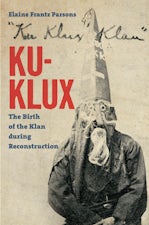Capital's Terrorists
Klansmen, Lawmen, and Employers in the Long Nineteenth Century
By Chad E. Pearson
324 pp., 6.125 x 9.25, 12 halftones
-
Paperback ISBN: 978-1-4696-7173-4
Published: November 2022 -
Hardcover ISBN: 978-1-4696-7172-7
Published: November 2022 -
E-book EPUB ISBN: 978-1-4696-7174-1
Published: October 2022 -
E-book PDF ISBN: 979-8-8908-6306-5
Published: October 2022
Buy this Book
- Paperback $34.95
- Hardcover $99.00
- E-Book $22.99
For Professors:
Free E-Exam Copies
Awards & distinctions
2022 Book of the Year Award, International Labor History Association
Ultimately, this book suggests that the birth of law and order politics as we know it can be found in nineteenth-century campaigns of organized terror against an assortment of ordinary people across racial lines conducted by Klansmen, lawmen, vigilantes, and union busters.
About the Author
Chad E. Pearson is assistant professor of history at the University of North Texas.
For more information about Chad E. Pearson, visit
the
Author
Page.
Reviews
"A well-documented and -crafted narrative, Capital’s Terrorists powerfully points us to the origins of anti-labor violence and terrorism rooted in racial supremacy ideologies, anti-immigrant xenophobia, and a pathological obsession with violence to uphold the existing capitalist order."—Journal of Labor and Society
"Capital's Terrorists adds a critical layer to our understanding of mass violence . . . [and] presents a series of fascinating case studies to make his point. . . . This is an outstanding and important book."—Arkansas Historical Quarterly
"Not only is Capitalist’s Terrorists an important history, but it is also essential to understanding the brutal truth of US capitalism and its meaning in today’s hypercapitalist reality."—CounterPunch
"Counter-revolution combines white supremacy, worker exploitation, and patriarchy. After the Civil War, it was maintained by the terror of lynching, kidnapping, massacres, drive-outs, blacklisting, and book burnings organized by gentlemanly brotherhoods of the propertied—the Ku Klux Klan, the Law and Order League, and the Citizen’s Alliance. Call them brutes in suits, millionaire murderers, or simply the bourgeoisie, their decentralized, disguised, dastardly, dark, and demonic deeds deserve damnation, as Chad Pearson factually describes and brilliantly shows."—Peter Linebaugh, author of Red Round Globe Hot Burning
"Grippingly narrated and drawn from a rich source base, Capital's Terrorists demonstrates that employer violence typified labor-management relations in the late nineteenth and early twentieth centuries. Pearson's detailed account of employers' anti-union actions sheds light on the organizers and perpetrators of direct violence; the people who suppressed information about employer violence and union voices; and the people who spun lies and half-truths to present employer violence in the best possible light. A must-read for anyone concerned with workers' lives past and especially present."—Nate Holdren, author of Injury Impoverished: Workplace Accidents, Capitalism, and Law in the Progressive Era


